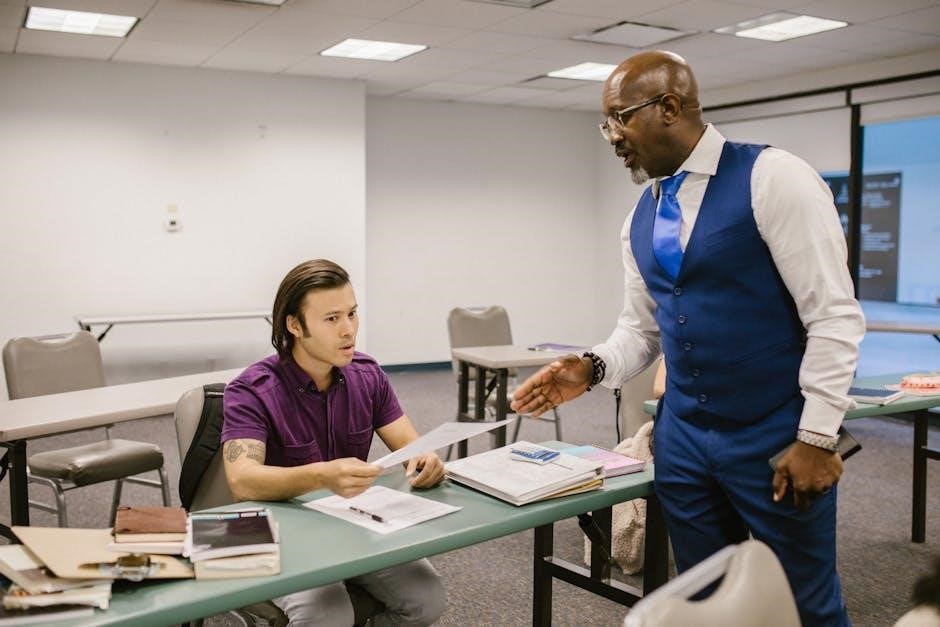
Overview of the Police Psychological Exam
The police psychological exam is a critical step in law enforcement hiring, assessing mental fitness, emotional stability, and decision-making skills. It evaluates candidates’ suitability for the demands of police work through standardized tests, interviews, and behavioral assessments, ensuring they can manage stress, make ethical decisions, and maintain professionalism. This exam is essential for identifying individuals who can uphold public trust and perform effectively in high-pressure situations.
Purpose and Importance
The police psychological exam is designed to evaluate a candidate’s mental fitness, emotional stability, and decision-making abilities, ensuring they are suited for the high-stress demands of law enforcement. Its primary purpose is to identify individuals who can manage stress effectively, make ethical decisions, and maintain professionalism under pressure. By assessing traits like moral judgment, problem-solving, and emotional resilience, the exam helps reduce risks of misconduct, burnout, or poor judgment. This evaluation is crucial for maintaining a reliable and competent police force, as it ensures officers can uphold public trust and perform their duties responsibly. The exam also safeguards community well-being by selecting candidates who align with the ethical and professional standards required for policing roles. Ultimately, it serves as a vital tool in building a trustworthy and effective law enforcement team.
Structure and Phases
The police psychological exam is structured into three distinct phases, each designed to comprehensively assess a candidate’s mental fitness for law enforcement roles. The process begins with a self-assessment phase, where candidates reflect on their personal traits, experiences, and emotional stability. This phase involves detailed questions about their background, lifestyle, and past behaviors, setting the foundation for further evaluation. Next, the multiple-choice phase includes standardized tests with questions focusing on personality traits, decision-making skills, and emotional resilience. This section is timed, mimicking real-world pressure, and helps psychologists identify behavioral patterns. Finally, the face-to-face interview with a licensed psychologist delves deeper into the candidate’s background, assessing honesty, consistency, and mental health. This phase also explores how candidates handle stress and make ethical decisions. Together, these phases provide a holistic evaluation of a candidate’s suitability for police work.

Types of Questions
The exam includes multiple-choice, true/false, scenario-based, open-ended, moral judgment, and personality assessment questions to evaluate emotional stability, decision-making, and ethical reasoning.
Multiple-Choice
The multiple-choice phase of the police psychological exam includes standardized tests with approximately 100 questions. These questions assess personality traits, emotional stability, and decision-making skills. Candidates have 15 minutes to complete this section, requiring quick and thoughtful responses. The questions are designed to evaluate stress management, problem-solving abilities, and moral judgment. This format ensures consistency across applicants while the time constraint mimics real-world pressure. Psychologists use the results to identify patterns in behavior and thought processes, providing insights into a candidate’s suitability for law enforcement roles. Preparation is key to navigating the format efficiently and ensuring accurate responses.
True/False
True/False questions in the police psychological exam are designed to assess emotional stability, stress management, and coping mechanisms. These questions evaluate how candidates handle pressure, remain calm in crises, and manage emotions. They often present scenarios that test a candidate’s ability to maintain composure under duress. Psychologists use these questions to identify individuals who can effectively manage the emotional demands of law enforcement roles. The goal is to ensure candidates can uphold public trust and maintain sound judgment in critical situations. True/False questions are a key component of the exam, providing insights into a candidate’s emotional resilience and decision-making abilities. They help psychologists predict how individuals will respond in high-pressure situations, ensuring they align with the ethical and professional demands of police work.
Scenario-Based
Scenario-based questions in the police psychological exam evaluate decision-making and problem-solving skills by presenting real-life situations, such as ethical dilemmas or critical incidents. These questions assess how candidates think under pressure, requiring logical reasoning, prioritization, and sound judgment. They often involve open-ended or multiple-choice formats, asking candidates to demonstrate how they would handle specific scenarios. The goal is to determine if candidates can make quick, ethical decisions aligning with legal and moral standards. These questions reflect the complexities of law enforcement roles, ensuring candidates can effectively manage challenging situations. By evaluating responses, psychologists identify individuals who can uphold professionalism and public trust, making scenario-based questions a crucial part of the exam. They provide valuable insights into a candidate’s ability to navigate the ethical and practical demands of policing.
Open-Ended
Open-ended questions in the police psychological exam require candidates to provide detailed, thoughtful responses, allowing psychologists to assess honesty, emotional stability, and decision-making skills. These questions often ask candidates to describe challenging situations, explain their thought processes, or discuss personal experiences. For example, candidates might be asked to recount a difficult decision they made and how they arrived at it. This format encourages candidates to express their genuine thoughts and feelings, providing deeper insights into their personality and judgment. Psychologists analyze these responses for consistency, emotional maturity, and the ability to reflect on past actions. Open-ended questions help evaluate a candidate’s problem-solving abilities, moral judgment, and capacity for self-awareness. They are a critical component of the exam, as they reveal how candidates think and behave in real-world scenarios, ensuring they align with the ethical and professional demands of law enforcement roles.
Moral Judgment
Moral judgment questions assess a candidate’s ability to resolve ethical dilemmas, a critical skill for law enforcement. These questions present scenarios involving honesty, integrity, and fairness, often requiring candidates to choose between conflicting values. For example, “Would you report a colleague for misconduct?” Such questions evaluate ethical reasoning and alignment with professional standards. The goal is to ensure candidates can make decisions that uphold public trust and legal principles, demonstrating sound moral character essential for policing roles. Honest and consistent responses are crucial, as psychologists assess the candidate’s ability to navigate complex ethical situations. These questions help identify individuals who can make quick, ethical decisions aligning with legal and moral standards, reflecting their ability to handle the complexities of law enforcement roles effectively. Moral judgment is a cornerstone of police work, ensuring officers maintain professionalism and public trust.
Personality Assessments
Personality assessments in police psychological exams evaluate traits like conscientiousness, emotional stability, and openness to experience. These questions probe how candidates handle stress, interact with others, and maintain composure. Tools like the MMPI (Minnesota Multiphasic Personality Inventory) identify potential behavioral patterns, ensuring candidates exhibit traits suitable for law enforcement roles. These assessments help psychologists predict how individuals will respond in high-pressure situations, ensuring they align with the ethical and professional demands of police work. By evaluating traits such as empathy, impulse control, and aggression, psychologists can identify candidates who are emotionally resilient and capable of maintaining professionalism. The goal is to ensure officers possess the mental and emotional traits necessary to uphold public trust and perform effectively in challenging roles. Personality assessments are a cornerstone of the exam, providing insights into a candidate’s long-term suitability for law enforcement duties.

Exam Format
The police psychological exam includes a self-assessment phase, multiple-choice tests, and a face-to-face interview. These phases evaluate mental fitness, emotional stability, and decision-making skills to ensure candidates are suited for law enforcement roles.
Self-Assessment Phase
The self-assessment phase begins with a self-interview where candidates reflect on their personal traits and experiences. This initial evaluation helps identify potential areas for deeper exploration. Candidates are typically asked to provide detailed answers about their background, lifestyle, and emotional stability. This phase sets the foundation for subsequent assessments, allowing psychologists to understand the candidate’s perspective before moving to standardized tests. Honesty is crucial here, as inconsistencies may arise in later stages. The self-assessment phase is a critical starting point for the overall evaluation process, ensuring a comprehensive understanding of the candidate’s mental fitness for law enforcement roles.
Multiple-Choice Phase
The multiple-choice phase of the police psychological exam includes standardized tests with approximately 100 questions, focusing on personality traits, emotional stability, and decision-making skills. Candidates have 15 minutes to complete this section, requiring quick and thoughtful responses. Questions are designed to evaluate stress management, problem-solving abilities, and moral judgment. The format ensures consistency across applicants, while the time constraint mimics real-world pressure. This phase helps psychologists identify patterns in behavior and thought processes, providing insights into a candidate’s suitability for law enforcement roles. Preparation is key to navigating the format efficiently, as the questions are tailored to assess how well candidates align with the ethical and professional demands of police work. Familiarizing oneself with the question types and time limits is crucial for success in this phase.
Face-to-Face Interview
The face-to-face interview is the final phase of the police psychological exam, conducted by licensed psychologists. It involves in-depth discussions about the candidate’s background, lifestyle, and past experiences. Psychologists assess mental health, emotional stability, and suitability for law enforcement roles. They also evaluate honesty and consistency in responses, using probing questions to clarify discrepancies. This personalized assessment ensures candidates are mentally fit for the demands of police work. The interview provides a comprehensive evaluation of a candidate’s readiness for the role, focusing on traits like decision-making, ethical judgment, and emotional resilience. Preparation involves practicing clear and concise communication while maintaining professionalism and authenticity. The goal is to present a genuine and trustworthy profile, demonstrating suitability for law enforcement roles through honest and consistent responses.

Preparation Strategies
Prepare using study guides, practice tests, and understanding the exam format. Focus on honesty, self-assessment, and familiarizing yourself with question types to improve readiness and reduce anxiety effectively.
Study Guides and Resources
Utilize reputable study guides and resources to prepare effectively for the police psychological exam. Reputable sources like JobTestPrep offer comprehensive materials, including sample questions, answer explanations, and practice tests. These guides provide insights into exam formats, such as multiple-choice, true/false, and scenario-based questions, helping candidates familiarize themselves with the content. Additionally, psychological assessment handbooks and resources specific to law enforcement, like the MMPI (Minnesota Multiphasic Personality Inventory), offer valuable insights into personality evaluations. Online forums and communities also share real-life examples and tips, enhancing preparation. Ensure to focus on understanding question patterns and improving self-assessment skills to enhance readiness for the exam. These resources are essential for building confidence and improving performance in the psychological evaluation process.
Practice Tests
Engaging with practice tests is a crucial step in preparing for the police psychological exam. These tests mimic real exam scenarios, covering topics like personality traits, emotional stability, and decision-making. Regular practice helps improve time management and reduces anxiety. Many practice tests include multiple-choice, true/false, and open-ended questions, simulating the actual exam format. By reviewing answer explanations, candidates gain clarity on expected responses, ensuring consistency and accuracy. Reputable sources like JobTestPrep offer comprehensive practice materials, while resources like the MMPI provide insights into personality assessments. Focus on understanding question patterns and recurring themes to better navigate the exam. Regular practice not only enhances familiarity with the content but also builds confidence, enabling candidates to present their best selves during the evaluation. This structured approach ensures readiness for the psychological exam’s challenges.
Time Management
Time management is essential for success in the police psychological exam, as candidates must complete sections efficiently within strict time limits. The multiple-choice phase, for instance, often includes 100 questions to be answered in 15 minutes, requiring quick and thoughtful responses. Practicing under timed conditions helps build speed and accuracy. Candidates should prioritize understanding question patterns and allocating time wisely to avoid rushing through critical sections. Effective time management reduces anxiety and ensures that all parts of the exam are attempted. By simulating exam conditions during practice, candidates can refine their pacing and decision-making skills, enhancing their overall performance. Proper time management is vital to demonstrate mental clarity and composure under pressure, traits highly valued in law enforcement roles.
Interview Preparation
Interview preparation is crucial for the face-to-face phase of the police psychological exam. Candidates should anticipate questions about their background, lifestyle, and past experiences, as psychologists assess mental fitness and emotional stability. Practicing responses to common questions, such as those about stress management or ethical dilemmas, helps build confidence. It’s essential to maintain honesty and consistency, as psychologists are trained to detect discrepancies. Candidates should review their personal history and be ready to discuss challenges openly. Dressing professionally and displaying calm demeanor during the interview is also important. Avoid exaggeration or omission, as psychologists evaluate authenticity. Familiarizing oneself with potential questions and articulating thoughts clearly enhances readiness. The goal is to present a genuine and professional self, demonstrating suitability for law enforcement roles through truthful and coherent responses.

Common Disqualifiers and Red Flags
Dishonesty, inconsistencies, and emotional instability are major red flags. Poor decision-making, lack of moral judgment, and aggressive tendencies can disqualify candidates, as they may indicate unfitness for law enforcement roles.
Dishonesty
Dishonesty is a significant red flag in police psychological exams, as it raises concerns about a candidate’s trustworthiness and integrity. Psychologists are trained to detect inconsistencies in responses, which may indicate deception or misrepresentation. Even minor discrepancies in answers can lead to disqualification, as honesty is crucial for law enforcement roles. Candidates who withhold information, exaggerate, or provide false answers risk being labeled unfit for duty. Dishonesty undermines the credibility of the evaluation process and suggests potential issues with ethical judgment. It is essential for candidates to provide accurate and truthful responses throughout the exam to ensure a fair assessment of their mental fitness. Any attempt to manipulate answers can damage a candidate’s credibility and jeopardize their chances of joining the police force.
Inconsistencies
Inconsistencies in responses during the police psychological exam are a critical concern, as they may indicate dishonesty or misrepresentation. Psychologists carefully analyze patterns in answers across different phases of the exam, including self-assessment, multiple-choice questions, and face-to-face interviews. Even minor discrepancies can raise red flags, suggesting potential issues with trustworthiness or authenticity. Candidates must ensure their responses are truthful and aligned across all sections of the exam. Inconsistencies can lead to disqualification, as they undermine the reliability of the evaluation process. It is essential for candidates to provide accurate and consistent information to demonstrate their suitability for law enforcement roles. Any irregularities in responses may prompt further investigation or result in rejection, emphasizing the importance of honesty and transparency throughout the exam.

Emotional Instability
Emotional instability is a key area of focus in the police psychological exam, as it directly impacts a candidate’s ability to handle the stresses of law enforcement. Psychologists assess how individuals manage emotions under pressure, remain calm in crises, and maintain composure in challenging situations. Questions, including true/false and scenario-based formats, evaluate coping mechanisms and reactions to high-stress scenarios. Emotional instability may manifest as impulsive behavior, difficulty regulating emotions, or an inability to maintain emotional balance. Such traits can hinder effective decision-making and interpersonal relationships, crucial for policing roles. The exam aims to identify candidates who can manage the emotional demands of police work, ensuring they can perform reliably and ethically. Poor emotional stability may lead to disqualification, as it poses risks of burnout, misconduct, or compromised judgment in critical situations. Assessing emotional resilience is vital for maintaining a competent and trustworthy police force.

Poor Decision-Making
Poor decision-making is a significant red flag in police psychological exams, as it can lead to unsafe or unethical actions in high-stakes situations. The exam evaluates a candidate’s ability to make sound, logical decisions under pressure through scenario-based and multiple-choice questions. These assessments present real-life dilemmas, such as ethical conflicts or critical incidents, to test problem-solving skills and moral judgment. Candidates are expected to demonstrate the ability to prioritize effectively, consider consequences, and align decisions with legal and ethical standards. Poor decision-making may stem from impulsive tendencies, lack of critical thinking, or inadequate problem-solving skills. Such traits can compromise public safety and trust, making them a disqualifying factor. Psychologists carefully analyze responses to ensure candidates exhibit the judgment and reasoning necessary for law enforcement roles. Identifying poor decision-making helps maintain a competent and reliable police force capable of handling complex situations responsibly.
Lack of Moral Judgment
Lack of moral judgment is a critical concern in police psychological exams, as it directly impacts ethical decision-making. The exam includes questions designed to evaluate a candidate’s ability to resolve ethical dilemmas, ensuring they can make decisions aligned with legal and professional standards. Scenario-based questions present situations involving honesty, integrity, and fairness, requiring candidates to choose between conflicting values. For example, questions may ask whether they would report a colleague for misconduct or uphold justice in morally ambiguous situations. Psychologists assess the candidate’s ability to prioritize ethical principles and maintain public trust. A lack of moral judgment can lead to poor decision-making, misconduct, and compromised public safety. This trait is closely examined to ensure candidates demonstrate the ethical reasoning necessary for law enforcement roles. Identifying such issues helps maintain a police force that upholds integrity and professionalism. Moral judgment is essential for building trust and ensuring just outcomes in communities.

Resources and Guides
Utilize study guides, practice tests, and psychological assessment handbooks like the MMPI for insights. Reputable sources such as JobTestPrep offer sample questions and tips to prepare effectively for the exam.
Recommended Study Materials
Reputable study guides and resources are essential for effective preparation. JobTestPrep offers comprehensive practice tests and sample questions tailored to police psychological exams. The MMPI (Minnesota Multiphasic Personality Inventory) handbook provides insights into personality assessments, helping candidates understand the evaluation process. Additionally, online forums and psychological assessment handbooks specific to law enforcement roles offer valuable tips and real-life examples. Utilizing these materials enables candidates to familiarize themselves with question formats, such as multiple-choice, true/false, and scenario-based queries. Regular practice with these resources improves time management, reduces anxiety, and enhances understanding of the exam’s structure. By focusing on these study aids, candidates can better prepare for the emotional stability, decision-making, and moral judgment assessments. These resources are crucial for gaining confidence and ensuring readiness to excel in the police psychological exam.

Online Practice Tests
Online practice tests are invaluable for preparing for the police psychological exam. Platforms like JobTestPrep and PoliceExam911 offer realistic simulations of the exam, featuring questions similar to those found in the actual test. These resources include multiple-choice, true/false, and scenario-based queries, mirroring the exam’s structure. Regularly engaging with these tests helps candidates improve time management, reduce anxiety, and familiarize themselves with the format. Many online tests provide detailed answer explanations, enabling candidates to understand their strengths and areas for improvement; Additionally, some platforms offer personality assessments and moral judgment exercises, which are critical components of the exam. By utilizing these tools, candidates can enhance their readiness and confidence, ensuring they perform at their best during the actual evaluation. Online practice tests are a key component of a comprehensive preparation strategy for the police psychological exam.

Understanding the Results
Exam results are interpreted to assess mental fitness and suitability for law enforcement roles. Scores evaluate emotional stability, decision-making, and moral judgment, providing feedback on strengths and areas for improvement.
Interpreting Scores
Interpreting scores from the police psychological exam involves evaluating candidates’ mental fitness and suitability for law enforcement roles. Scores are benchmarked against standardized norms to assess traits like emotional stability, decision-making, and moral judgment. High scores indicate strong suitability, while low scores may raise concerns about a candidate’s ability to handle stress or make ethical decisions. Psychologists analyze consistency across multiple phases, including self-assessment, multiple-choice tests, and interviews, to ensure accurate evaluations. Inconsistencies or poor performance in key areas may lead to disqualification. The interpretation process ensures that only candidates with the necessary psychological traits proceed to the next stages of the hiring process. This rigorous evaluation helps maintain the professionalism and reliability of law enforcement officers, ensuring they can uphold public trust and perform effectively in high-pressure situations.
Feedback and Next Steps
After completing the police psychological exam, candidates receive feedback on their performance, highlighting strengths and areas for improvement. This feedback is crucial for understanding their mental fitness and suitability for law enforcement roles. If a candidate passes, they proceed to the next stage of the hiring process, such as a final interview or background check. If they fail, they may receive insights into specific areas needing improvement, such as emotional stability or decision-making; In some cases, candidates may be given the opportunity to retake the exam after addressing identified issues. The feedback process ensures transparency and helps candidates understand their standing. It also allows hiring departments to confirm that only the most suitable individuals advance. This step is vital for maintaining the integrity and professionalism of law enforcement teams, ensuring they are prepared to serve the community effectively.